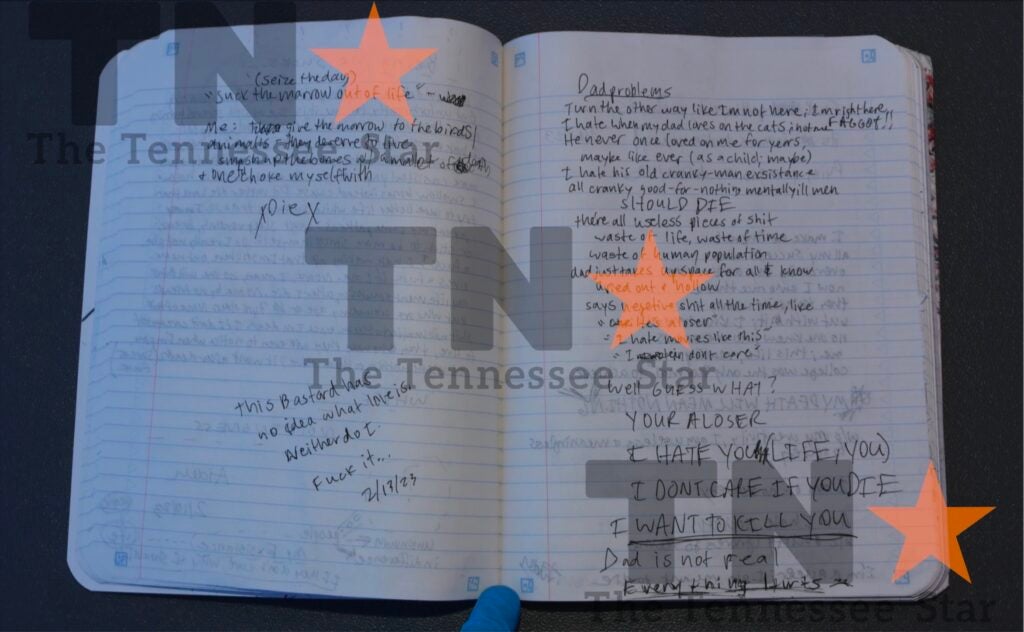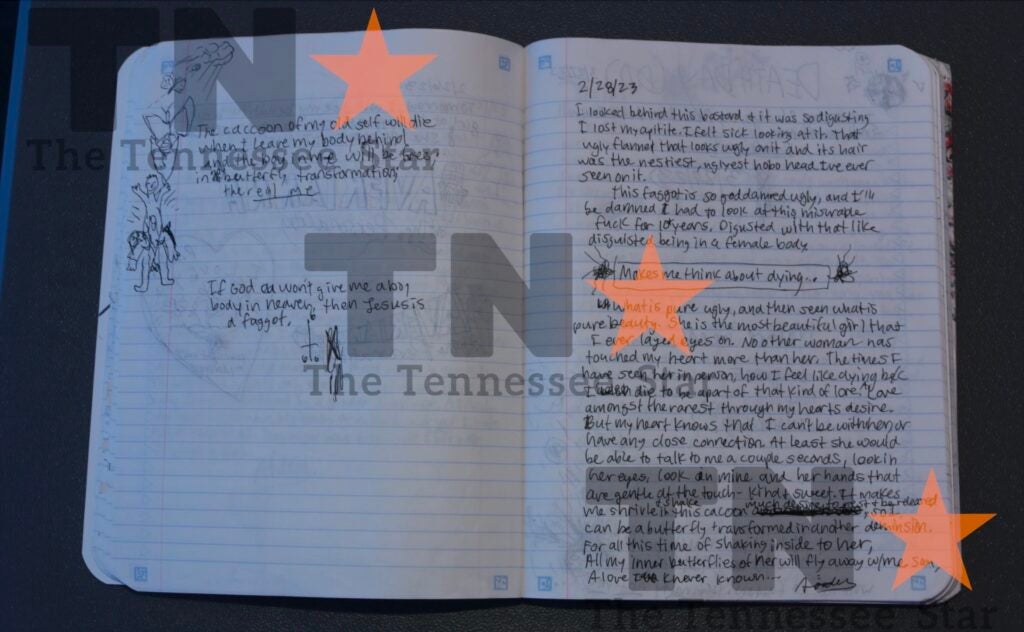The Tennessee Star released the full journal of the Nashville, Tennessee, shooter Tuesday, and its contents reveal how transgender orthodoxy can encourage suicidal tendencies—and worse—in a way that turns gender identity into a kind of religion.
Audrey Hale, the 28-year-old female who identified as male, opened fire at the Covenant School in Nashville on March 27, 2023. Before police shot and killed her, Hale killed three children and three adults—Evelyn Dieckhaus, Hallie Scruggs, and William Kinney, all 9; Cynthia Peak, 61; Katherine Koonce, 60; and Mike Hill, 61.
The Metro Nashville Police Department recovered 90 pages of Hale’s writings in a collection the Tennessee Star refers to as “The Covenant Killer’s 2023 Journal.” A source familiar with the investigation provided the journal to the Star in June 2024. Police also recovered a spiral notebook with writings about locations, including a map of the school and how Hale planned to enter the school and kill people there. Authorities also recovered 20 additional journals Hale wrote between 2007 and 2022. The Star obtained only the 2023 journal.
Michael Patrick Leahy, the Star’s editor-in-chief, said a Nashville government lawyer confirmed the journal’s authenticity in court. The Star filed a Tennessee Public Records Act request for all the Hale documents in April 2023, and the news outlet is appealing a judge’s refusal to order the documents published.
Leahy also claims that Davidson County, Tennessee, Judge L’Ashea Myles sent a letter on June 10, ordering him into her courtroom on June 17, on the pretext that he had violated a court order. Leahy claims he had violated no court order and that Myles refused to provide the court order in question. He further claims that Myles altered the reason for the meeting on June 17 in moves that created “a chilling effect on my First Amendment rights.”
“According to Tennessee Supreme Court rules, judges are ethically prohibited from commenting on ongoing cases,” J. Bart Pickett, state trial courts administrator, told The Daily Signal, which had approached his office to receive Judge Myles’ side of the story.
Rage Against Her Father
Hale’s journal reveals a great deal of anger against her father.
Hale’s writings repeatedly fixate on her erotic desire for a girl and include frequent laments that she is female and so cannot be in a heterosexual relationship with the object of her affection.
“I’m in the wrong body,” Hale writes.
“A terrible feeling to know I am nothing of the gender I was born of,” she adds. “I am the most unhappy boy alive. I wish to be dead.”
“Either I have too much b**ch-ass estrogen, or I’m just a sad lonely boy,” she writes. She recalls applying for art jobs and getting rejected, time and time again.
“It’s simple yet everything to me of adult life sucks—more complicated than it should be,” Hale writes. “Death is simple.”
She repeatedly condemns her father, referring to him as a “faggot,” and writing, “A day without a father will be a better day.”
In one passage titled “Dad problems,” Hale writes, “I hate when my dad loves on the cats; not me. He never once loved on me for years.” She adds, “all cranky good-for-nothing mentally ill men SHOULD DIE. They’re all useless pieces of sh**.”
She repeatedly condemns her father for giving her advice and attempting to encourage her that life will get better.

A Religious Hope
The Daily Wire’s Brent Scher previously released documents from Hale’s journal in which the shooter condemns Christians, but the journal’s overall tone suggests a belief in a warped version of Christianity centered on gender.
Hale condemned “F***ing parents like [hers] who think of themselves first and their preference of conservative religion-gay sh** make them believe that the child they are given should stay that way.”
She wrote, “Make them go to youth group + force Christian friends in their life because the old ones were a ‘bad’ influence. … Parents actually believe religion can change nature. That could explain why I don’t practice religion anymore. Let kids think for themselves … .”
Yet, Hale’s suicidal tendencies rested on the belief that she would go to heaven and receive a male body.
“I don’t want a free golden start to an opportuned [sic] new life. I just want another life beyond this realm,” she wrote.
She wrote that the way people addressed her drove her to suicide, as if public acceptance of her claimed gender identity was a matter of life and death.
“When I’m called a lady or ma’am—damn it, it makes me not want to exist,” she wrote.
Perhaps the most revealing passage involved a metaphor: Hale hoped that after she died, her “male” spirit would escape her female body as a butterfly leaves behind its cocoon.
“The caccoon [sic] of my old self will die when I leave my body behind, and the boy in me will be free in my butterfly transformation; the real me,” she wrote.
Her emphasis on gender above all else appeared to lead her to question the goodness of God.
“If God won’t give me a boy body in heaven, then Jesus is a faggot,” she wrote.

Yet at other points in the journal, she addresses God directly.
“My faith is weak,” she wrote, while expressing hope that she’ll be in “a better place” after her rampage. “God forgive me.”
Her faith appears based on a form of Gnosticism—an ancient Christian heresy built on the notion that the physical world is evil and the spiritual world is good, so salvation involves a rejection of, and escape from, the physical world. Her notion of a spiritual reality in opposition to her physical body—a male identity in opposition to her female body—drove her to desire death as a release from the physical world.
The elevation of “gender identity” over physical reality need not drive those who identify as transgender to suicide or to angry tirades, but it appears to have done so for Hale.
Practical Questions
The journal raises important questions about whether Hale’s massacre could have been prevented. The shooter initially planned her attack for Jan. 17, but she couldn’t go through with it. She wrote about calling a suicide hotline five times.
She planned the shooting again for Feb. 17, but her journal records that the Covenant School had been closed that day, due to weather.
As the Star reported, Hale’s journal references her therapist in “a possible allusion to her status as a 22-year mental health patient at Vanderbilt University Medical Center (VUMC), where police documents obtained by The Star reveal she was twice evaluated for commitment.”
On her final journal entry, Hale wrote, “There were several times I could have been caught, especially back in the summer of 2021.”
These elements raise important questions about the case. What did the authorities know about Hale? Had her therapist warned authorities about her? What does the spiral notebook reveal about her plans? What do previous journals reveal about her decision to target the Covenant School, which she had previously attended?
Did Hale take testosterone before engaging in her rampage?
Why do authorities seem so intent on hiding the journals nearly 18 months after the shooting? Do they fear that Hale’s religious approach to gender identity might undermine the appeal of gender ideology in American society?































